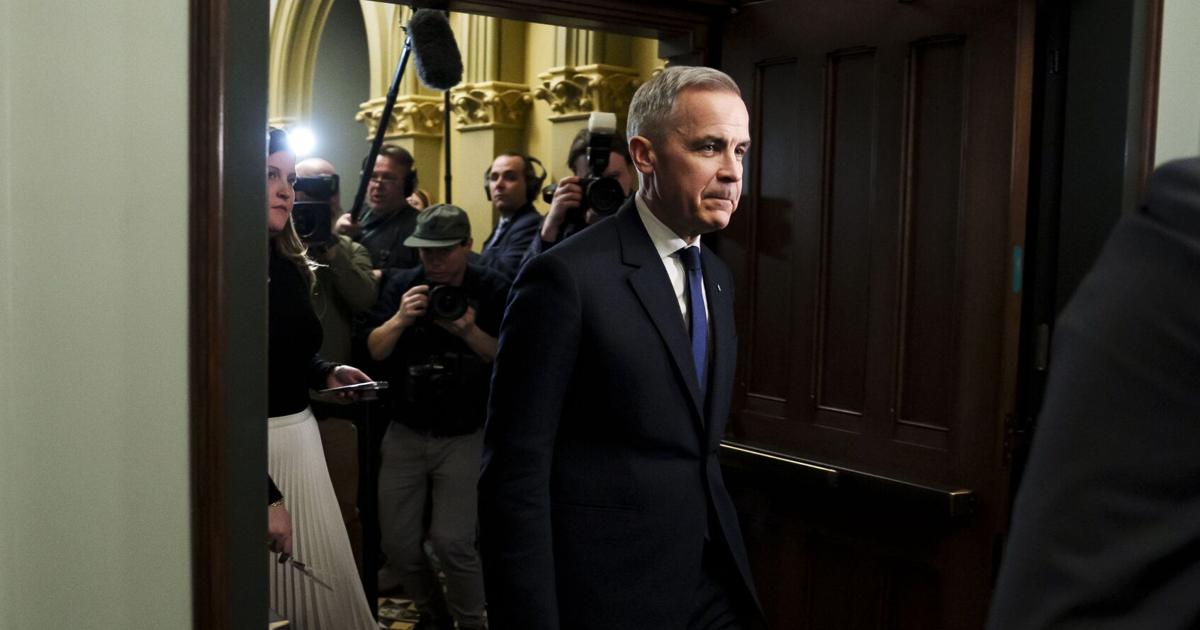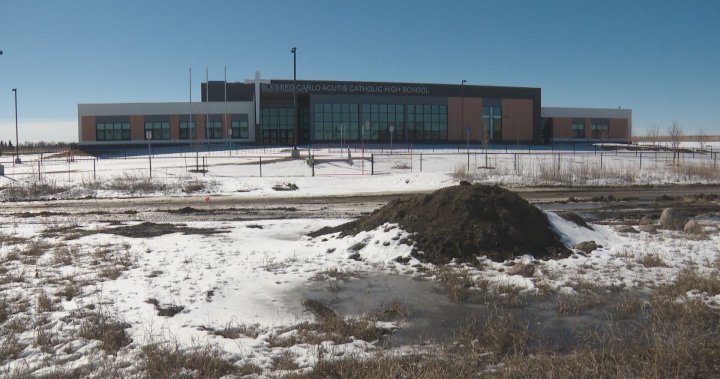OTTAWA—Canada struck back against the United States with a retaliatory counter-tariff punch on $35 billion worth of American vehicles shipped for sale into Canada as the fallout of President Donald Trump’s sweeping new trade measures walloped stock markets and rattled relations around the world.
The day after Trump flipped the table on the global trading order and hit more than 180 countries and territories — big and small, allies and rivals alike — with punishing tariffs of 10 to 50 per cent, Prime Minister Mark Carney said the Trump tariffs “will rupture the global economy and adversely affect global economic growth” likely causing a recession in the U.S. which could bleed into Canada.
Carney walked a fine line between striking back against Trump’s newly-imposed auto tariffs on Canada with matching retaliatory duties on American vehicles imported into Canada, and angling for a more advantageous re-set of the Canada-U.S. relationship while he courts allies elsewhere.
Canada’s duties will hike costs on Canadian importers and consumers, and raise about $8 billion in revenue which Carney said would be poured back into supports for the thousands of workers hit by what he called Trump’s “unjustified, unwarranted and…misguided” tariffs.
The tariff war had an immediate impact at the Stellantis auto plant in Windsor, Ont. which announced 4,000 workers would be temporary laid off — starting April 7 — as the company paused production for two weeks to assess the fallout. Union officials also said that workers at auto parts manufacturers, which supply the assembly plant, would be impacted and bring the total number of layoffs to 6,000 workers.
Carney predicted Trump will continue with his tariffs until the pain that Americans feel “becomes impossible to ignore.”
Until then, he said, Canada will need to make “difficult choices” and “sacrifices” to endure the economic conflict.
Global stock markets plunged and the U.S. dollar weakened, leading to a stronger loonie Thursday, as investors sized up Trump’s tariff plan and ran for cover.
In Toronto, the TSX Composite Index plunged 3.8 per cent, wiping out $152 billion of share value. In New York, the S&P 500 fell 4.8 per cent, wiping out $1.92 trillion (U.S.).
Leaving Washington, Trump shrugged off the reaction, calling it necessary short-term pain to cure an ailing patient and telling reporters, “The markets are gonna boom, the country is gonna boom.”
The U.S. tariffs barely spared Canada, where steel, aluminum, autos and any other exports that do not comply with the continental free trade deal’s rules and standards are slapped with Trump’s 25 per cent tariffs, 10 per cent in the case of oil, gas and potash.
Trump hit the European Union with a 20 per cent surcharge, prompting European Commission President Ursula von der Leyen to call his trade war “a major blow to the world economy.”
China, which got an additional 34 per cent reciprocal tariff, rebuked Trump. Foreign ministry spokesman Guo Jiakun warned “trade wars and tariff wars have no winners, and protectionism will lead nowhere,” adding “more and more countries have come to stand against the U.S.’s tariff hikes and other unilateral bullying moves.”
U.S. allies like Australian Prime Minister Anthony Albanese said “this is not the act of a friend.”
Carney, who departed briefly from the campaign trail to lead talks with advisers and the premiers, agreed.
He said although international allies are talking — he’d consulted German chancellor Olaf Scholz Thursday — they are not co-ordinating retaliatory responses. However, he said, “Canada is ready to take a leadership role in building a coalition of like-minded countries who share our values.”
The U.S. is no longer a global champion of free and open trade, Carney said, telling a nationally televised news conference on Parliament Hill that “while this is a tragedy, it is also the new reality” which means Canada’s relationship with America has to change too.
“Our old relationship of steadily deepening integration with the United States is over,” said Carney. He quickly qualified the powerful declaration, walking back the implication he would cut defence or security ties, like Norad.
“The U.S. is absolutely our ally. It’s our ally in security and defence partnerships. It’s our most important security ally,” he said. “It’s still, even with these tariffs, the largest trading partner. The point I made … is part of what our relationship has been based on, though, has been a degree of integration between our economies, our trade becoming closer and closer together. That is over.”
Immediately after the federal election, whoever is elected prime minister must negotiate a new trade deal to secure Canada’s economic and commercial interests, which must reflect that Canada should buy more of its defence equipment from other allies, Carney said.
In Kingston on Thursday, Conservative Leader Pierre Poilievre made a similar pitch for himself to lead coming trade negotiations, saying he would press Trump to pause all tariffs until a new deal could be reached.
Poilievre accused Trump of “attacking” Canada again with tariffs, and pledged to support the Canadian auto industry by removing federal sales tax from vehicles made in this country.
The willingness of Carney and Poilievre to renegotiate a free trade deal with Trump contrasted with that of NDP Leader Jagmeet Singh, who said Thursday Canada shouldn’t rush back into trade talks with the Americans, after Trump violated the North American trade agreement that he agreed to in his first term.
That deal is scheduled for review in 2026, and Singh said Canada should focus on standing “in solidarity” with Mexico against the Trump tariffs, he said.
In the wee hours of Thursday morning, Trump’s latest volley in the escalating trade war landed on Canadian automakers, prompting concerns that thousands of jobs will be lost in the coming days.
In Canada’s case, Trump kept in place existing tariffs imposed in recent weeks against steel and aluminum, and goods that don’t comply with 2018’s Canada-United States-Mexico Agreement (CUSMA).
According to Carney’s spokesperson Emily Williams, Canada’s response means counter-tariffs will be imposed on fully fabricated cars imported into Canada from the U.S., but not on auto parts that criss-cross the border before going into finished cars.
If the completed vehicle does not comply with CUSMA, then the entire automobile will be subject to a 25 per cent counter-tariff, Williams said. If the completed vehicle complies with CUSMA, the 25-per-cent tariff will apply only to components inside the automobile that aren’t made in either Canada or Mexico.
Williams confirmed that this means $35.6 billion worth of U.S. auto imports will be hit with Canada’s new counter-tariff, expected to take effect in the coming days, and raise about $8 billion in revenue — before any remissions requested by importers.
Flavio Volpe, head of the Canadian Automotive Parts Manufacturers’ Association, called the Liberal leader’s retaliation plan a “measured” attempt to strike a balance between responding adequately and trying to minimize harm to the Canadian industry.
“You want to be careful in your retaliation not to hurt the companies that sell and make cars here,” said Volpe. “(But) I also heard him say that any tariffs that we generate will flow to these companies, and that we will continue to recommit ourselves to the companies that make cars in this country.”
Unifor national president Lana Payne echoed that view.
“We have to keep the plants here, we have to keep the footprint here, and that means we’ve got to exert our own carrot-stick pressure wherever we can,” said Payne in an interview. “And I think this approach that the prime minister has taken will help us protect the auto industry in Canada.”
At Queen’s Park, Premier Doug Ford said the provincial and territorial leaders are united. “We all agreed that we got the best of a bad deal, which, in my opinion, is still totally unacceptable. The only thing that’s acceptable is zero tariffs,” said Ford after a 30-minute first ministers’ meeting with Carney.
The premier expressed surprise at the speed at which layoffs hit auto factories on both sides of the border.
“I thought it would (take) about a week, but obviously it’s right down to days now on the supply chain, and I’ve been saying this over and over again, a tariff on Canada is a tax on Americans,” he said.
“I mentioned Termination Day. There’s a perfect example.”
Ford added that he “would support retaliation tariffs” and that U.S. booze would remain off LCBO shelves during the trade war.
Singh also called for new Second World War-style “victory bonds” that Canadians could by from the government at guaranteed interest rates to boost public coffers during the crisis.
“We are in a war. We’re in a trade war. It’s a war that was unprovoked, unjustified, frankly illegal,” said Singh said.
With files from Rob Benzie, Queen’s Park bureau chief
Error! Sorry, there was an error processing your request.
There was a problem with the recaptcha. Please try again.
You may unsubscribe at any time. By signing up, you agree to our terms of use and privacy policy. This site is protected by reCAPTCHA and the Google privacy policy and terms of service apply.
Want more of the latest from us? Sign up for more at our newsletter page.



